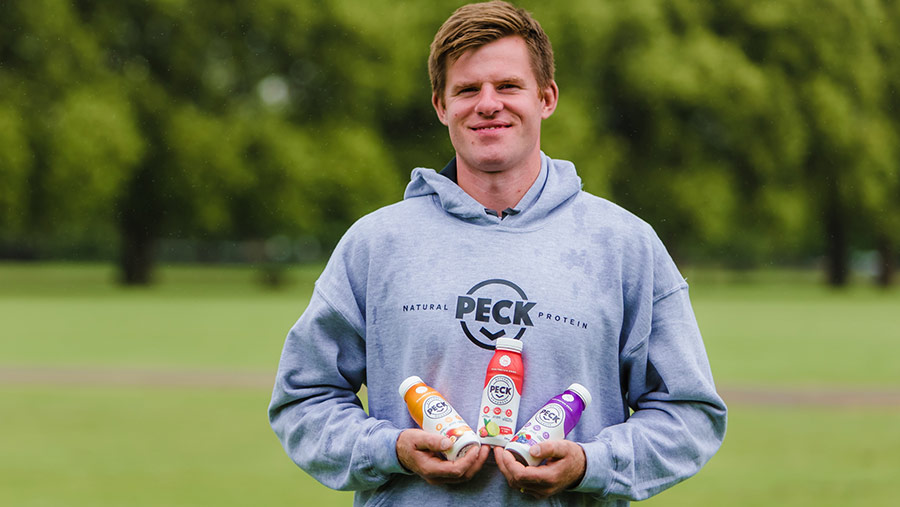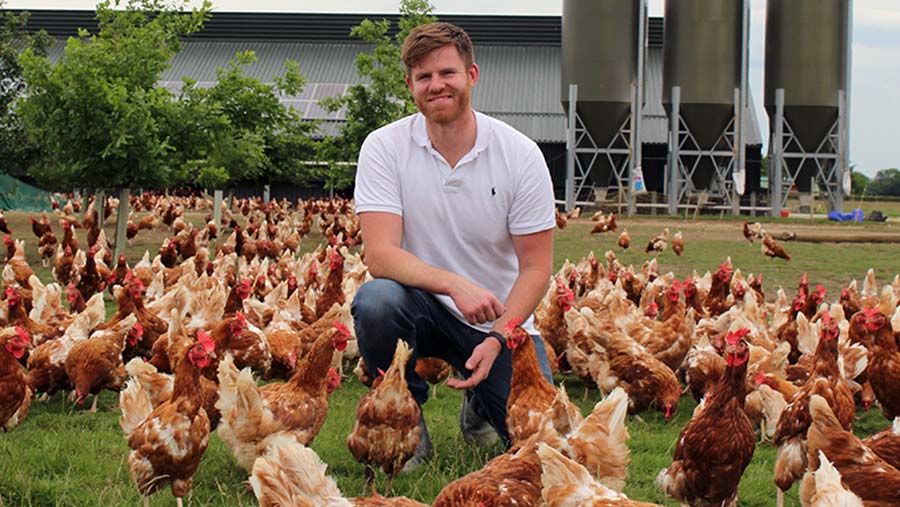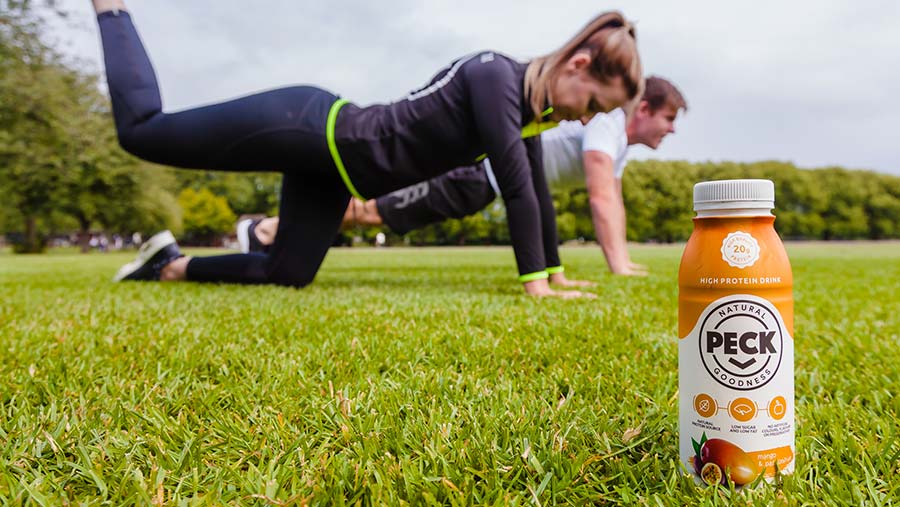Savvy young farmer turns waste eggs into protein drink

When Matt Havers returned to his family’s farm, he was clear that he had to bring something new to the business besides an extra pair of hands.
As a keen rugby player and gym-goer, he knew that protein drinks for fitness junkies were in high demand and meant big business.
Combining his love of farming and fitness was the perfect way to bring him into the farm partnership with his parents, Chris and Sheila.
Farm facts
- 200ha arable land growing wheat, barley, oilseed rape and beans
- 16,000 free-range laying hens, producing about 15,000 eggs a day
- 2,000 pigs, fattening on a bed and breakfast contract
- Peck drinks diversification launched in 2018
- Product price range: £1.99-£2.35 per bottle
Four years ago Matt was sat behind a desk in a generic London office, working for a consumer insights company which road tested bold new products with their target markets.
The free-range laying unit back on the Havers family farm near Eye in Suffolk had recently been through a tough winter.
Mild, soggy conditions had knocked the flock’s health and the number of second-grade eggs being laid was up significantly, dragging profits down by 10%.
See also: So you want to… sell food and drink direct to the public?
Any eggs with imperfections, such as a wrinkled, discoloured or weak shell, are classed as second-grade and usually end up going to the food processor or mass-catering industry for next to no money.
Shell defects mean they are prone to breaking accidentally and end up as food waste.
Typically the farm’s 16,000-strong flock of layers will produce about 15,000 eggs every day, roughly 2.5% of which are considered unsuitable for selling direct to the consumer.

© Oli Hill/RBI
Enterprising Matt was determined to find a better use for these misfits and employed his consumer-focused expertise to hone in on a gap in the market – the UK’s first and so far only egg-based protein drink.
“Eggs are one of the most nutritionally complete food sources. They have a whole host of healthy fats, proteins, vitamins and minerals,” explains 31-year-old Matt.
“Second grade eggs didn’t command top price and often went for liquid egg production. I knew that there was more value to be added there.”
Each bottle of his Peck drink contains about six egg whites, which equates to 20g of pure protein in one 250ml bottle – a similar protein level to that of popular dairy-based protein drinks, but with fewer calories.
All the farm’s second-grade eggs are used in Peck drinks, along with eggs from other local farms.
Once the whites have been separated, they are blended with fruit juices and whole ground soya beans, which helps to stabilise the egg mix.
Matt currently imports organic soya from the US, but hopes to convince his dad to grow soya beans on the home farm for use in his drinks.
Taste test
The first thing you notice about a Peck drink is how surprisingly unsweet each of the three flavours are compared with more typical protein drinks.
That’s no accident, as Matt wanted his products to have a genuine fruity taste without being crammed with sweeteners.

Developing the recipe took patience, and plenty of trial and error with flavours and consistency.
Pasteurising methods had to be tailored too. The mixture is blended using raw egg white and decanted into bottles, before being put into a warm water bath to pasteurise the egg cocktail without scrambling it.
There’s no need to keep the drinks chilled and they have a shelf life of six months.
Business brain
To get his bright idea off the ground, Matt made a successful bid for a £40,000 Agri-Tech growth initiative grant in a Dragon’s Den-style pitch to the Local Enterprise Partnership.
In the past 18 months, Matt has sold more than 30,000 bottles of Peck drinks online and in a trial with a major supermarket.
He has plans to launch a whole egg version of his drinks, providing a healthy source of fat and sugar from the yolk and high protein for serious athletes and sports-players.
There are also ambitions to create a whole egg shot – giving the nutritional benefits of one egg in a short, tasty drink form.
Matt’s top diversification tips
- Make it easy on yourself – look at what your farm business is already doing and think about how you can make more of that. This is much easier than starting from scratch.
- Trust your gut instincts, don’t be put off by people saying something can’t be done and back yourself. Make sure you do your homework and be sure there is a demand for whatever you are planning to offer.
- Don’t expect things to happen quickly, stay focused and treat the setbacks as learning curves.
